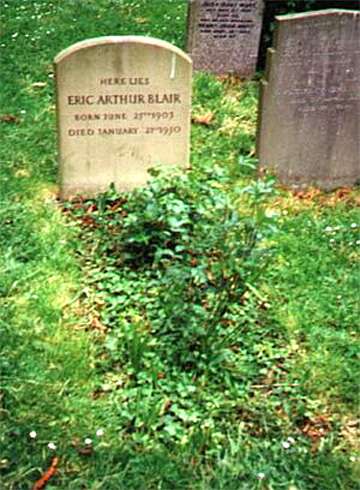Before accepting the task of reading George Orwell's 1984 I found this particular quote bouncing around in my mind:
"He who learns but does not think, is lost! He who thinks but does not learn is in great danger." - Confucious
Naturally, I interpreted this as a sign to clean up my act and actually do some research before jumping into something I wasn't prepared for. With "He who thinks but does not learn is in great danger" looming above myself I realized that the best way for me to really engage myself in the novel, and at the same time apparently protect myself from a dangerous situation, would be to acquaint myself with the author, and maybe uncover some possible influences his experiences had upon his writing of 1984.
Born Eric Arthur Blair in 1903, "George Orwell" was brought up by his mother and three sisters, seeing his father only once in his life before he turned nine years old. As a young child Mr. Orwell befriended Jacintha Buddicorn, a local girl of about the same age one day in a field. Mr. Orwell had been standing on his head, and when inquired as to why he was doing that, he replied "You are noticed more if you stand on your head, than if you are right side up". Together he and his new friend dreamed of becoming famous writers; he even went as far as to say that one day he hoped to write a novel like H.G. Wells' A Modern Utopia. Later in his life, after years spent honing his writing skills; Orwell worked as a policeman in Burma for about five years before becoming ill and being forced to return to his home in England. It is no secret that while he may have behaved like a British officer was expected to at the time, he was not that person mentally.
"While in Burma, he acquired a moustache similar to those worn by officers of the British regiments stationed there. [He] also acquired some tattoos; on each knuckle he had a small untidy blue circle. Many Burmese living in rural areas still sport tattoos like this - they are believed to protect against bullets and snake bites."
- Emma Larkin, Introduction, Burmese Days, Penguin Classics edition, 2009
During this time Orwell also wrote his first novel, Burmese Days.
After years of moving around, from Paris to London and even to his parents' home in Southwold, England Orwell soon became a public figure withhis post WWII novel Animal Farm (1945). Following his newfound recognition some say Orwell literally worked himself to death, he spent four of his last five years mixing both journalistic work for various newspapers and magazines with his own writing... writing that would soon be finished and published in 1949. It was titled 1984. A year later on January 21st, 1950 George Orwell passed away at the University College Hospital. He would be buried beneath the words "Here lies Eric Arthur Blair", an overly-modest hedge stone for such an extraordinary writer.

Not a bad idea. How might you incorporate some of this research into your APOLOGIA? Of what significance is the author in determining a classic? Think on this for a while.
ReplyDelete